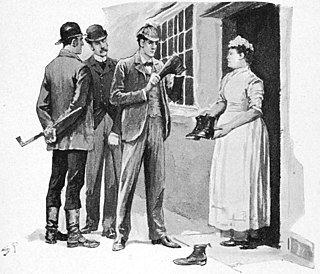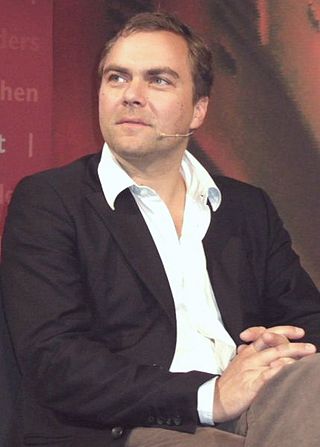
Detective fiction is a subgenre of crime fiction and mystery fiction in which an investigator or a detective—whether professional, amateur or retired—investigates a crime, often murder. The detective genre began around the same time as speculative fiction and other genre fiction in the mid-nineteenth century and has remained extremely popular, particularly in novels. Some of the most famous heroes of detective fiction include C. Auguste Dupin, Sherlock Holmes, and Hercule Poirot. Juvenile stories featuring The Hardy Boys, Nancy Drew, and The Boxcar Children have also remained in print for several decades.

Crime fiction, detective story, murder mystery, mystery novel, and police novel are terms used to describe narratives that centre on criminal acts and especially on the investigation, either by an amateur or a professional detective, of a crime, often a murder. It is usually distinguished from mainstream fiction and other genres such as historical fiction or science fiction, but the boundaries are indistinct. Crime fiction has multiple subgenres, including detective fiction, courtroom drama, hard-boiled fiction, and legal thrillers. Most crime drama focuses on crime investigation and does not feature the courtroom. Suspense and mystery are key elements that are nearly ubiquitous to the genre.

Fantômas is a fictional character created by French writers Marcel Allain (1885–1969) and Pierre Souvestre (1874–1914).

Mystery is a fiction genre where the nature of an event, usually a murder or other crime, remains mysterious until the end of the story. Often within a closed circle of suspects, each suspect is usually provided with a credible motive and a reasonable opportunity for committing the crime. The central character is often a detective, who eventually solves the mystery by logical deduction from facts presented to the reader. Some mystery books are non-fiction. Mystery fiction can be detective stories in which the emphasis is on the puzzle or suspense element and its logical solution such as a whodunit. Mystery fiction can be contrasted with hardboiled detective stories, which focus on action and gritty realism.
The police procedural, police show, or police crime drama, is a subgenre of procedural drama and detective fiction that emphasizes the investigative procedure of a police officer or department as the protagonist(s), as contrasted with other genres that focus on either a private detective, an amateur investigator or the characters who are the targets of investigations. While many police procedurals conceal the criminal's identity until the crime is solved in the narrative climax, others reveal the perpetrator's identity to the audience early in the narrative, making it an inverted detective story. Whatever the plot style, the defining element of a police procedural is the attempt to accurately depict the profession of law enforcement, including such police-related topics as forensic science, autopsies, gathering evidence, search warrants, interrogation and adherence to legal restrictions and procedure.

Michael Joseph Connelly is an American author of detective novels and other crime fiction, notably those featuring LAPD Detective Hieronymus "Harry" Bosch and criminal defense attorney Mickey Haller. Connelly is the bestselling author of 31 novels and one work of non-fiction, with over 74 million copies of his books sold worldwide and translated into 40 languages. His first novel, The Black Echo, won the Mystery Writers of America Edgar Award for Best First Novel in 1992. In 2002, Clint Eastwood directed and starred in the movie adaptation of Connelly's 1997 novel, Blood Work. In March 2011, the movie adaptation of Connelly's novel The Lincoln Lawyer starred Matthew McConaughey as Mickey Haller. Connelly was the President of the Mystery Writers of America from 2003 to 2004.

Arsène Lupin is a fictional gentleman thief and master of disguise created in 1905 by French writer Maurice Leblanc. The character was first introduced in a series of short stories serialized in the magazine Je sais tout. The first story, "The Arrest of Arsène Lupin", was published on 15 July 1905.

Håkan Nesser is a Swedish author and teacher who has written a number of successful novels, mostly but not only crime fiction. He has won Best Swedish Crime Novel Award three times, and his novel Carambole won the prestigious Glass Key award in 2000. His books have been translated from Swedish into more than twenty languages.

Tatort is a German language police procedural television series that has been running continuously since 1970 with some 30 feature-length episodes per year, which makes it the longest-running German TV drama. Developed by the German public-service broadcasting organisation ARD for their channel Das Erste, it is unique in its approach, in that it is jointly produced by all of the organisation's regional members as well as its partnering Austrian and Swiss national public-service broadcasters, whereby every regional station contributes a number of episodes to a common pool.

Sherlock Holmes has long been a popular character for pastiche, Holmes-related work by authors and creators other than Arthur Conan Doyle. Their works can be grouped into four broad categories:

WDR Fernsehen is a German free-to-air television network owned and operated by Westdeutscher Rundfunk and serving North Rhine-Westphalia. It is one of the seven regional "third programmes" television stations that are offered within the federal ARD network.

Polizeiruf 110 is a long-running German-language detective television series likened to Poirot. The name links to the emergency telephone number of the Volkspolizei. The first episode was broadcast 27 June 1971 in the German Democratic Republic (GDR), and after the dissolution of Deutscher Fernsehfunk the series was picked up by ARD. It was originally created as a counterpart to the West German series Tatort, and quickly became a public favorite.
Dennis Satin is a German film director and screenwriter. He became internationally recognized for the film Dangerous Dowry (1996), as director and screenwriter; starring: Katja Riemann and Hannes Jaenicke.
"The Fiend with Twenty Faces" is a fictional character who serves as a recurring antagonist for Kogoro Akechi in Edogawa Rampo's mystery fiction. A gentleman thief and master of disguise, he is considered Akechi's archenemy or most famous adversary.
Buddy Giovinazzo is an American independent filmmaker and author who is known for his gritty, low-budget debut film, Combat Shock, and his collection of harrowing short stories of low urban life in his 1993 anthology, Life Is Hot in Cracktown.

Klaus Johannes Behrendt is a German actor. Since 1992 he has starred in the Westdeutscher Rundfunk version of the popular television crime series Tatort; he also stars in the 2008 film Die Bienen - Tödliche Bedrohung.
Wilsberg is a German TV series based on novels about the fictional private detective Georg Wilsberg. A first TV episode was aired in 1995, five years after the release of the first novel, starring Joachim Król. Since the second episode, Leonard Lansink has been starring as Georg Wilsberg.

Jakob Bothe, better known by his pen name Jakob Arjouni, was a German author. He received the 1992 German Crime Fiction Prize for One Man, One Murder.

Detective chief inspector Frank Thiel and forensic medical examiner Dr. Karl Friedrich Boerne are the lead protagonists of the German television series, Tatort Münster.

Alwara Höfels is a German actress who works both in front of the camera and on the theater stage.















